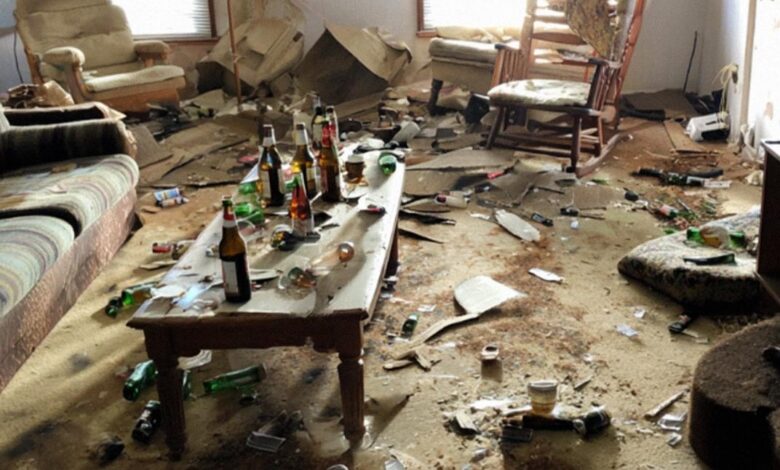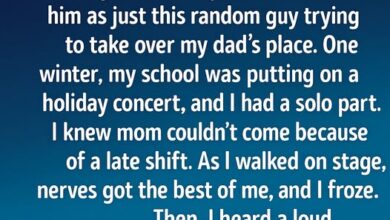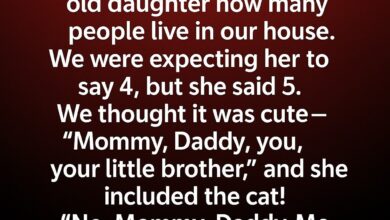
My Kids and I Went to the Beach House I Inherited from Grandma and Found It Trashed – A Day Later, Karma Stepped In
When Becky packed her kids into the car and headed for the coast, she imagined a trip filled with peace, laughter, and the comforting familiarity of her late grandmother’s beach house. For years, she had carried the image of that house like a secret sanctuary. It was the place she thought of when work wore her down, when bills piled up, and when the heat of her children’s bickering felt too heavy. In her mind, it was still the same as it had been in her teenage years—lace curtains filtering morning light, her grandmother’s old radio humming in the kitchen, and the gentle creak of the rocking chair on the porch at night.
Instead, when she unlocked the door, the air that greeted her was sour and wrong. The smell of stale beer mixed with cigarette smoke, and beneath it lingered the unmistakable stench of rot. Becky’s children, Daniel and Rosie, paused at the porch, their excitement instantly dampened. They had been buzzing all morning about soft sand, bunk beds, and salty breezes. Becky had promised them this trip as a celebration, a chance to claim something that was theirs after years of scrimping and sacrificing. But the dream shattered the moment she stepped inside.
The carpet squelched beneath her shoes, sticky and damp. Furniture was overturned. Her grandmother’s beloved coffee table lay splintered in a corner, as if someone had stomped on it for sport. The rocking chair that had once been a place of comfort was broken, abandoned on its side. Empty bottles lined the counters, pizza boxes and cigarette butts littered the floor. Rosie slid her hand into her mother’s, whispering, “Mommy, what happened here?” The question hit Becky like a punch. Childhood should not come with that kind of fear.
She tried to reassure them, telling them to play outside while she tidied up. But as she moved through the house, the destruction only worsened. In the kitchen, drawers dangled open. A frying pan with dried, crusted remains sat in the sink. And then—she froze. A sound. A low, steady snore coming from the main bedroom.
Her heart thudded as she crept down the hallway, every nerve tense. Pushing open the door, she was stunned to find not a stranger but her own mother-in-law, Susan, sprawled across her grandmother’s bed with her boots still on, a half-empty bottle of wine nearby.
Susan opened her eyes slowly, smiling as if nothing were out of place. “Surprise, Becky-Boo,” she said, stretching like she owned the place.
The explanation tumbled out with infuriating ease. She had taken the spare key Becky left by her front door and rented the house out to a group of college students for a party. They paid in cash, she boasted, and she had simply “supervised” until they left. To her, the wreckage was just “kids being kids.”
Becky’s anger burned. This wasn’t just a house—it was the last piece of her grandmother, a place woven with memories of comfort and belonging. Susan waved it off, insisting Becky was overreacting. When Becky demanded she get up and start cleaning, Susan scoffed, acting as if Becky was the unreasonable one.
Steven, Becky’s husband, arrived soon after with gloves, trash bags, and cleaning supplies. He didn’t yell or ask questions. He just pulled Becky into a hug and then started working silently beside her. The three of them—Becky, Steven, and an unrepentant Susan—cleaned through the afternoon. Each time Susan muttered that it was “no big deal,” Becky ignored her, focusing on scrubbing away the stench and reclaiming her space.
By sunset, the house was somewhat livable again. Becky told Susan she would pay for the damages, a thousand dollars at the very least. Susan laughed at her, claiming she didn’t have the money. When Steven sided firmly with Becky, telling his mother she had crossed a line, Susan lashed out, calling Becky pathetic and jealous. But when Steven’s voice hardened and made clear he stood with his wife, Susan spat on the floor and stormed out.
The silence she left behind was strangely freeing. For the first time all day, Becky felt like she could breathe. That night, Steven took Rosie into town for fish and chips while Becky stayed with Daniel, sipping cocoa on the porch. Wrapped in quilts, they listened to the ocean’s steady rhythm. It wasn’t the idyllic trip Becky had imagined, but it was real—a reminder that peace sometimes comes not from perfection, but from surviving the storm together.
The next morning, Becky replaced the locks. Susan called in a panic, saying a burst pipe had flooded her own home and begging to stay at the beach house. Becky didn’t hesitate. She told her to find a hotel with the money she’d made off renting out what wasn’t hers. Karma, it seemed, had stepped in.
As the days went on, the family reclaimed the house in their own way. They played in the sand, built castles that the tide swallowed, and filled the air with laughter that softened the scars inside. Steven started a barbecue, Rosie darted around with her stuffed rabbit, and Daniel planned how to turn his room into the ultimate blanket fort. Slowly, the house absorbed their joy, as though healing alongside them.
On the last evening, Becky sat on the porch, watching the sun set into the waves. Steven’s hand rested over hers, steady and strong. Home, she realized, wasn’t just walls or furniture. It wasn’t even the memories of the past. It was the people who refused to give up on you, the ones who cleaned the wreckage and stayed to rebuild. For the first time in a long time, she felt the kind of peace her grandmother would have wanted her to inherit.
That night, she slept soundly, no longer haunted by broken things.




